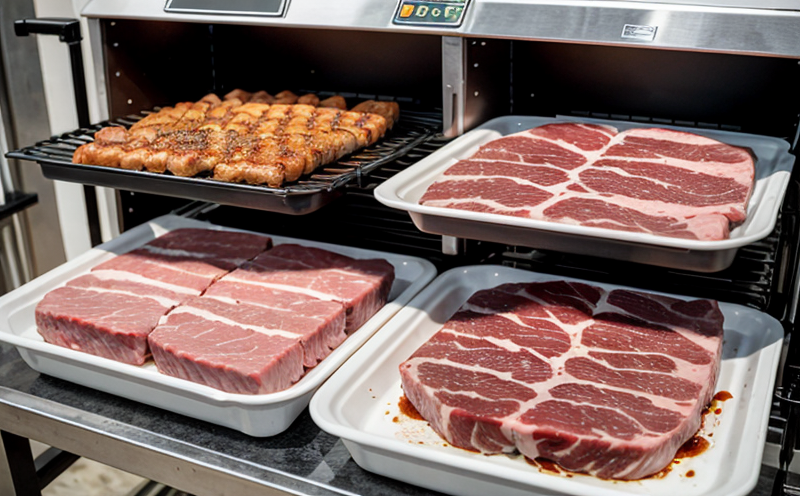ISO 11290 Listeria Detection in Meat Products
The presence of Listeria monocytogenes, a Gram-positive, facultative anaerobic bacterium, poses significant health risks to vulnerable populations such as pregnant women, the elderly, and immunocompromised individuals. Meat and poultry products are particularly prone to contamination with this pathogen due to their nature and handling processes. This is where ISO 11290 comes into play.
ISO 11290 specifies a method for detecting Listeria monocytogenes in meat products using the modified MYPAR agar plate method. The protocol involves several critical steps that ensure accurate and reliable detection of the pathogen. Specimen collection is crucial; samples must be taken from raw, ready-to-eat, or processed meats to assess their safety.
The process begins with the appropriate preparation of the sample, which typically includes dilution in buffered peptone water (BPW) for a more accurate enumeration of viable cells. After incubation at 35°C ± 2°C for 18–24 hours, selective enrichment is performed using MYPAR agar plates. These plates contain thymol blue as an indicator to detect the presence of Listeria. Plates are further incubated aerobically at 35°C ± 2°C for another 18–24 hours.
The detection method is designed to be both sensitive and specific, with a detection limit set at 10 CFU/g. This ensures that even small quantities of the pathogen are not missed during testing. The protocol also includes quality control measures such as positive and negative controls to validate each batch of plates.
Once the incubation period is complete, colonies suspected of being Listeria are identified by their characteristic appearance on MYPAR agar—blue to purple colored colonies with a green halo. Confirmation is achieved through biochemical tests like the catalase test or further subculturing and identification using API systems.
The importance of this method cannot be overstated, especially given the increasing demand for food safety compliance in the global market. ISO 11290 not only ensures that meat products meet international standards but also enhances consumer confidence by reducing the risk of Listeria outbreaks.
In conclusion, adhering to ISO 11290 is essential for maintaining high-quality and safe food products. By implementing this standard in your production processes, you can significantly reduce the likelihood of contamination and ensure compliance with regulatory requirements.
Benefits
Implementing ISO 11290 for Listeria detection offers several key benefits:
Enhanced Food Safety: By detecting and eliminating potential pathogens, you can significantly reduce the risk of foodborne illnesses. This is particularly important in sectors where vulnerable populations are more likely to consume your products.
Regulatory Compliance: Adhering to international standards like ISO 11290 ensures that your meat and poultry products meet stringent regulatory requirements, thereby avoiding potential legal issues and sanctions.
Consumer Confidence: By demonstrating a commitment to food safety through rigorous testing protocols, you can build trust with consumers and enhance brand reputation. This is especially valuable in today’s highly competitive market where transparency and quality are paramount.
Improved Product Quality: Regular testing helps identify potential sources of contamination early on, allowing for timely corrective actions that improve overall product quality.
Competitive Advantage: In a world where food safety is becoming an increasingly important factor in consumer purchasing decisions, being able to demonstrate compliance with international standards can give your company a competitive edge.
Eurolab Advantages
At Eurolab, our expertise extends beyond just adhering to ISO 11290. We offer a comprehensive range of services tailored to meet the unique needs of your industry:
Comprehensive Testing Capabilities: Our laboratory is equipped with state-of-the-art facilities and experienced personnel who can conduct a wide array of tests, including those specific to meat and poultry products.
Custom Solutions: We understand that each client has different requirements. Our team works closely with you to design and implement customized testing protocols that address your specific needs.
Dedicated Client Support: From initial consultation to final report, our dedicated support ensures a seamless experience throughout the entire process. Our goal is to provide you with actionable insights that drive better business decisions.
Accurate and Timely Reporting: We prioritize accuracy and speed in reporting test results so that you can take swift action if necessary. This timely feedback loop helps maintain high standards of quality control.
Quality and Reliability Assurance
We at Eurolab are committed to maintaining the highest levels of quality and reliability in all our services. Our adherence to international standards such as ISO 11290 is just one aspect of this commitment:
ISO Certification: We hold multiple ISO certifications, including ISO/IEC 17025 accreditation for our testing laboratories. This certification ensures that we meet the highest standards of quality and reliability in our methods.
Dedicated Quality Control: Our laboratory is staffed with highly qualified professionals who are dedicated to maintaining stringent quality control measures at every step of the process.
Continuous Improvement: We regularly review and update our processes to incorporate new technologies and methodologies that enhance accuracy and efficiency. This continuous improvement approach ensures that we remain at the forefront of food safety testing.





